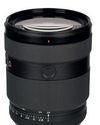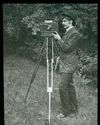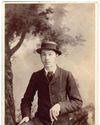
Marilyn Stafford (b. 1925)
Marilyn Stafford's name will be well known to many AP readers, as she received our Lifetime Achievement Award in 2019. Her photographic career got off to a remarkable start when she was invited to take stills of Albert Einstein by friends who were interviewing the physics genius for a documentary film. In the car they handed Stafford, a photographic novice, a 35mm camera, along with a crash course on how to use it. Her subsequent images were very well received. In December 1948 she moved to Paris and befriended Robert Capa, who suggested she become a war photographer (a suggestion that didn't appeal) and Henri Cartier-Bresson. Cartier-Bresson encouraged Stafford to take photographs on the streets of Paris, advice she fortuitously followed.
Stafford accumulated an eclectic body of work, which spans from 1948 to 1980.
Strong empathy
Her photographs include further portraits of famous and influential figures such as Edith Piaf, Henri Cartier-Bresson, Indira Gandhi, Albert Finney and Joanna Lumley. She also photographed many ordinary people, such as the illiterate Sicilian peasant, Francesca Serio, who took the Mafia to trial for murdering her son. Stafford witnessed some of the 20th century's most turbulent events, including Algerian refugees in Tunisia fleeing the war of independence in 1958 - this gained her front page of the Observer. Beyond documentary work, she set up a fashion photography agency, and later the Marilyn Stafford FotoReportage award, to support professional women photographers. 'I think of myself as a storyteller, speaking through the lens of my camera,' Stafford observed. 'I have always endeavoured to find a way to bring awareness to the public eye, to tell stories that are socially relevant, and to create change for the better.'
Elliott Erwitt (b. 1928)
This story is from the {{IssueName}} edition of {{MagazineName}}.
Start your 7-day Magzter GOLD free trial to access thousands of curated premium stories, and 9,000+ magazines and newspapers.
Already a subscriber ? Sign In
This story is from the {{IssueName}} edition of {{MagazineName}}.
Start your 7-day Magzter GOLD free trial to access thousands of curated premium stories, and 9,000+ magazines and newspapers.
Already a subscriber? Sign In

Calling The Shots: A Queer History of Photography
Offering an unprecedented view of photographic history through a queer lens, this is a wonderful and powerful book, says

Large-aperture standard zoom, too
SONY has also revealed a new premium standard zoom, the FE 28-70mm F2 GM.

Super-fast, high-res Sony Alpha Ai II
SONY has announced its new professional full-frame flagship camera, the Alpha A1 II.

39 awesome accessories
Our round-up of the best accessories we've used and reviewed this year, along with some old favourites. There's something here for every budget, starting from just £7, including tripods, bags, filters and much more

Such a thing as society
This autumn sees the launch of a major new book and exhibition devoted to examining the multiplicities of photography during 1980s Britain. Peter Dench finds out more

Join Club
The sociable Canvey Island Photographic Club is keen to grow its in-person meet ups

Capturing flight
Winners and finalists of Bird Photographer of the Year share their tips for success with Hollie Latham Hucker

140 years of change
AP has become the world’s oldest surviving consumer photo magazine because we have moved with the times, says Nigel Atherton

Preserving history in platinum
A deep dive into the meticulous art of platinum printing, and the collaboration between the Royal Geographical Society and Salto Ulbeek. Mike Crawford explores how they brought historical photographs to life with enduring beauty and precision

Life in the past lane
What was life like for an amateur photographer in 1884? John Wade takes a trip back in time